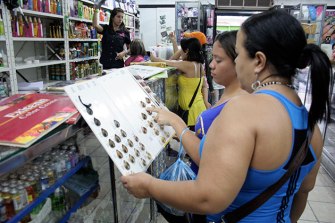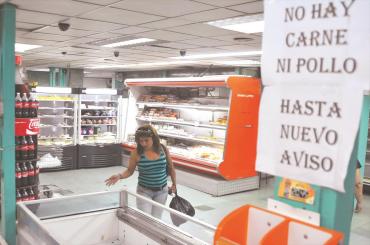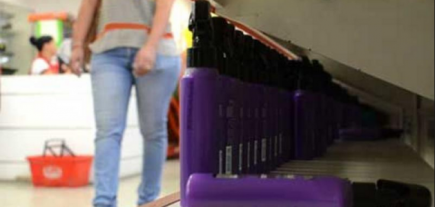 Venezuela is known for its beautiful women –if we are allowed to say so ourselves.
Venezuela is known for its beautiful women –if we are allowed to say so ourselves.
But our high beauty standards are expensive, and no stranger to scarcity. So a negative involuntary consequence –what us economist usually call a “negative externality”- of the current economic crisis is that we are becoming less and less tidy, stylish, and flirty.
Let’s not forget the very popular Venezuelan saying:
“No hay mujer fea, sino mal arreglada”
-There is no such thing as an ugly woman. Just an unkempt one.
We decided to ask the opinion of experts: our more-than-girly girlfriends. The question: how is the current economic crisis affecting the beauty habits of Venezuelan women?
The beauty salon is a must… up to what we can afford.
Beauty salons used to be full, at all times. The smell of burnt hair and nail polish would let you know that there was beauty in the making only a few feet away.
However, times seem to be changing.
“Women sacrifice to pay for their beauty treatments, because they are one of the only affordable pampering treats you can give yourself. But maybe you used to go to the beauty salon once a week, and now you can probably go once every other week”.
“Now I get a manicure and pedicure once a month, instead of once a week”.
“I’m seeing more curly hair in the streets, probably because keratin hair straightening treatments are imported, and have become really expensive”.
According to El Nacional, a woman can spend between BsF 910 and BsF 1,500 for a wash, cut, and blow-dry combo. That represents between 13% and 22% of one month’s minimum wage.
No wonder clients are cutting their visits to the hair salon by half.
Our hair is a direct victim of the crisis.
“My curls are suffering. Everytime I have to change my hair product brand, my curls take some time to adjust and I can’t showoff my full and beautiful curls”.
Scarcity is the number one enemy of our hair problems. It’s pretty tough to get any type of shampoo, let alone our favorite brand. And if we do get it, we have to take care of it as if our [hair’s] life depended on it.
“The other day I left my shampoo and conditioner at the club, and I almost had a nervous breakdown because I thought had lost them and wouldn’t be able to wash my hair”.
“I don’t even dye my hair anymore”.
Hair coloring is a rather expensive service. If you’ve got the cash to pay for it, the beauticians might ask you to get the products on your own. And if you choose to DIY at home, you’re going to come across the almighty scarcity problem.
Hair coloring products are hard to find. And if you do find them, it’s not your preferred brand or color. Blond and purple are the colors you tend to find regularly in pharmacies so, as you might imagine, many women have had to change their hair colors.
Are we becoming fatter?
“The crisis is also affecting the dieting habits. Many products are nowhere to be seen and one must eat what can be found. That is probably affecting the weight of Venezuelan women.”
We both, Anabella and Bárbara, have pretty different eating habits.
One of us can eat pretty much whatever she wants and keep a ridiculously light weight. The other eats ridiculously healthy stuff to keep her weight.
Anyhow, both of our eating habits have been affected by the crisis. We cannot always choose what we want to eat. The “there’s no beef or chicken” welcome is becoming rather common in many restaurants. And the popular Sasha Fitness dieting recommendations are almost impossible to find – or way too expensive.
Maduro claims we are obese because we eat too much. We think that Venezuelans might be eating more, but are not eating healthier. And the official data seems to prove this.
 By 2013 (the last official available data), of the 20 most consumed food products, 39.8% of the Venezuelan diet consisted of corn flour, white rice, bread, pasta, refined sugar, pasteurized fruit juices, and soft drinks; 15.5% consisted of chicken, beef, eggs, cheese, milk and black beans; 11.6% consisted of plantains, melon, papaya, guava and natural orange juice; 1.4% vegetable oil; and 8.9% coffee.
By 2013 (the last official available data), of the 20 most consumed food products, 39.8% of the Venezuelan diet consisted of corn flour, white rice, bread, pasta, refined sugar, pasteurized fruit juices, and soft drinks; 15.5% consisted of chicken, beef, eggs, cheese, milk and black beans; 11.6% consisted of plantains, melon, papaya, guava and natural orange juice; 1.4% vegetable oil; and 8.9% coffee.
And with the increasing scarcity levels of beef and chicken, and the difficulties in finding milk and quality affordable cheese, protein levels are being substituted for more and more processed carbs.
Becoming fatter is not just a matter of aesthetics. It’s a matter of health.
“I used to go to a nutritionist… not anymore”.
We all are victims of la cola.
It’s becoming rather common to find that many are missing work hours or whole days in order to be able to buy the groceries for their homes. And hair salons don’t seem to be the exception.
A friend told us that a couple of weeks ago, she went to get a haircut. Right after she got her hair washed, someone came into the salon, said that some scarce products had arrived at a supermarket close by, and all salon workers raced out, abandoning their job posts to get on the supermarket line. EVERYONE, including the salon’s cashiers.
***
There are many more examples to give, like the scarcity of make-up and nail polish remover, or the impact of los apagones -blackouts- on beauty salon equipments. But the bottom line is still the same: we probably won’t lose our “most beautiful women” status, but it is going to be rather difficult –and expensive- for us Venezuelan women to keep looking tidy, stylish, and flirty.




Saludos
I think the word you were looking for is “unkempt,” with an “m”
Favor de perdonar la imprudencia – I just remember it having been helpful when I was learning Spanish that my native speaker friends would point out stuff like that for me.
Thanks for an interesting post…
LikeLike
I think the word you were looking for is araña, with an “ñ”. Favor de perdonar la imprudencia you too – I just remember it having been helpful when I was learning English that my native speaker friends would point out stuff like that for me.
Thanks for an interesting comment…
LikeLike
Yes, exactly like that, see what I mean?!
LikeLike
“No hay mujer fea, sino mal arreglada”
Has now become
“No hay mujer fea sino hombre pobre”
LikeLike
“No hay mujer fea sino hombre pobre”, so sad …
LikeLike
It’s sadder when you realize that it alludes to how no matter how “ugly” you are there’s nothing a little plastic surgery can’t fix, paid for by the man in your life.
LikeLike
“No hay mujer fea sino gobierno chavista”
LikeLike
Stylish, beautiful women are a sign of decadence. No place for them in the Peoples Socialist Paradises. SO bourgeoisie!!
LikeLike
Anabella,
Should we worry about this? Probably not, the lack of hair dye, lipstick or hair straightener won’t affect the political or economical landscape.
Are Venezuelan women worried about this? They probably are, but personal beauty products or habits are perceived as minor when compared to food scarcity. I’m sure most women are more concerned about finding milk for their children than shampoo or conditioner.
It ticks me off a bit that some women think that going to the salon is must – perhaps this crisis will help us realign our values.
LikeLike
To take care of your own appearence, by showing your individuality, and that you are still alive, is an act of defiance by itself. In concentraton camps, the guards and other prisoners knew that one prisoner spirit had been broken when he stopped taking care of himself. They knew that that one would be the next in line to die. And they were always right (Viktor Frankl wrote about that). In amidst all this madness, to STILL have women going to the salon is an EXCELLENT sign. They haven’t given up yet!
LikeLike
indeed…. taking care of your appearance is the preservation of dignity. What dignifies us varies to person to person, but appearance is very valued to some, and rightly so.
Viktor Frankl’s book on the pursuit of meaning is one of the best things I ever read.
LikeLike
Yes, Rodrigo, it’s a wonderful book.
LikeLike
“…personal beauty products or habits are perceived as minor when compared to food scarcity. I’m sure most women are more concerned about finding milk for their children than shampoo or conditioner.”
It’s useful to remember that the regime always wants to keep people busy with basic primal needs so they can’t ever think on another thing, like the fat fish being a bunch of drug dealing corrupt bastards.
LikeLike
I appreciate Anabella’s efforts in trying to tackle another dimension of our crisis. But I agree with crios: to realize that some women think that going to the salon is must speaks volumes of the scale of priorities in this country (not to mention its value system). How much more do we have to repeat the ridiculous cliche that Venezuelan women are famous for their beauty? I dislike the general tone of this piece, and I think the same interesting facts about how much it costs (or how hard it is) to keep one’s personal appereance in decent shape in this country, would have benefited from Anabella and Barbara opting for a more in-depth analysis than the shallow take they chose for constructing this article.
LikeLike
Last week there was an excellent series of investigative reports (translated into Spanish) in the New York Times on nail bars. Arepas are good but they are killers. So are nail bars, apparently.
Under communism in eastern Europe, women in their middle years almost invariably had the same, unnatural looking redish-purple hair colour. I am sure they were glad to be liberated from that.
LikeLike
On nails:
http://www.nytimes.com/interactive/2015/05/08/nyregion/nail-warnings-es.html
LikeLike
Iris Varela looks great
LikeLike
YNYO,
Your user name cracks me up.
LikeLike
Reblogged this on TROZAN.
LikeLike
Again, this one is fitting here:
LikeLike
People should be able to buy the shampoo and soaps and whatever they want in an open market.
The problem of obesity is really huge. Venezuelans are the most obese in the American continent,
after the US Americans and, as Anabella says, that is because of very bad, poor eating possibilities.
As for Venezuelan women’s beauty: with all due respect, Venezuelan women are no more beautiful or uglier than women from anywhere else. Of course, de gustibus non est disputandum.
LikeLike
La mujel rebolusionaria son laj maj bella del mundo. Hoy fui pal salon de las uñas pero llego el pollo y serraron.
LikeLike
que horror. Mañana a primera hora, puej, polque andal con fusil con laj uñaj feaj da ajco.
LikeLike
“Venezuelans are the most obese in the American continent”
Do you have data to confirm this statement?
LikeLike
“after the USA”, I wrote.
Sí. En 2011 se decía que estábamos en tercer lugar (detrás de los gringos y mexicanos):
http://www.bbc.co.uk/mundo/noticias/2011/02/110204_obesidad_global_men.shtml
Here the same:
http://www.dailymail.co.uk/wires/ap/article-2735332/Venezuela-battles-obesity-amid-dearth-good-food.html
(the article talks about South America)
I can’t find the newest whereby we might have overtaken the Mexicans, but every time I watch some recent footage from both countries, I think we definitely managed to overtake the fajita-burrito eaters.
LikeLike
There is a difference between “the most” and third place.
But yes, last time I visited everyone seemed so wide.
LikeLike
Read the first message I wrote:
“Venezuelans are the most obese in the American continent, after the US Americans”
So, it is not about the very first one in America but the first one after the US Americans (or the second one according to that article)
LikeLike
I get it. Venezuelans are fat.
LikeLike
In a country whose citizen’s diet consists almost ONLY on flour-based products (pasta, empanadas or arepas) combined with sedentary lifestyles said people are bound to become fat.
LikeLike
Just to drive the point home….
http://www.dailymail.co.uk/health/article-2920219/How-fat-country-nations-highest-obesity-rates-new-maps-surprise-you.html
Notice which country is >30 BMI in S. America.
And people wonder why the FAO wants to give the country an award.
They have the USA listed at 33 (11th), Mexico at 32.1 (17th), and Venezuela is apparently somewhere outside the top 20 between 31.3 and 30.1.
Either way, not anything to be proud of, all around.
At least the government can take comfort in the rojo rojito map coloring.
LikeLike
I read in the Economist that Mexico passed the US? Either way there are several countries nipping at the Empire’s heels in this department.
LikeLike
I thought it was Mexico who was leading the statistics in latin american obesity.
LikeLike
What about Whisky? Are Venezuelans still drinking like they used to?
Even now when I smell whisky I think of Christmas and family reunions.
LikeLike
Yes, but less of it. People are actually drinking more rum now. Which is good. It is much better to drink good quality rum, such as is produced in Venezuela, than cheap blended whiskeys they import. I always suspected that most Venezuelans drink whiskey because it is a status symbol rather than because the really like it.
Actually, I suspect that people are drinking less alcohol in general, since we don’t go out nearly as much because of the insecurity.
LikeLiked by 1 person
I have never liked whiskey, no matter what they served me. I felt like a gringo in Venezuela sometimes when I would ask for a rhum and that in better times.
The funny thing: I lived in Scotland for a time and I never saw as much whiskey drinking there as in Venezuela. People would booze a lot but it would be beer.
I supposed they didn’t have subsidies to Scottish whiskey as Venezuelans had.
LikeLike
You need to try some good single-malt whiskeys. Huge difference from the blended stuff.
LikeLike
Vodka is becoming popular.
LikeLike
“a woman can spend between BsF 910 and BsF 1,500 for a wash, cut, and blow-dry combo. That represents between 13% and 22% of one month’s minimum wage.
No wonder clients are cutting their visits to the hair salon by half.”
Cutting by half? That is ridiculous.They should totally ALL learn to cut and wash each other’s hair with those percentages.
Beauty is not about false arreglos.Beauty is in a natural face, cleanliness, and a kind and happy expression.
I never thought a fake look beautiful.It’s about values.I am hoping that now that Venezuelan women will have to cut down on luxury and live more like women from other parts of the world, they will undergo a positive value change.This is actually a good thing.
What is not good is the lack of healthy affordable food.
LikeLike
hoy me toca haserme las mechas con agua axigenaa, despuej de la novela, que ejta guenisima.
LikeLike
Sorry for the off of topic but I just wanted to share a video that Cuban blogger Yusnaby Pérez put on his facebook page it’s called Caracas 1972 I was stunned by knowing what your country is going though today!!https://youtu.be/L_nKJS3J2cA
LikeLike